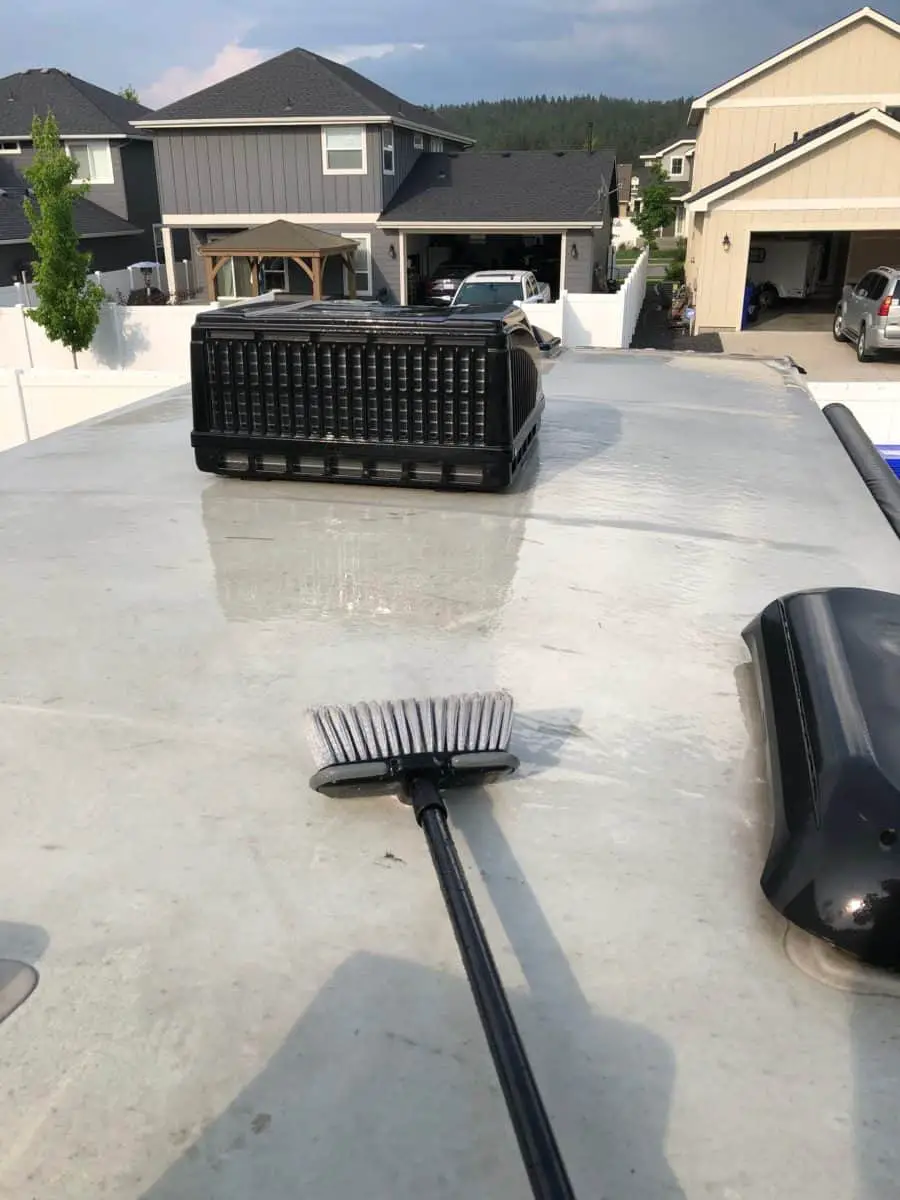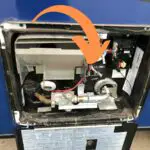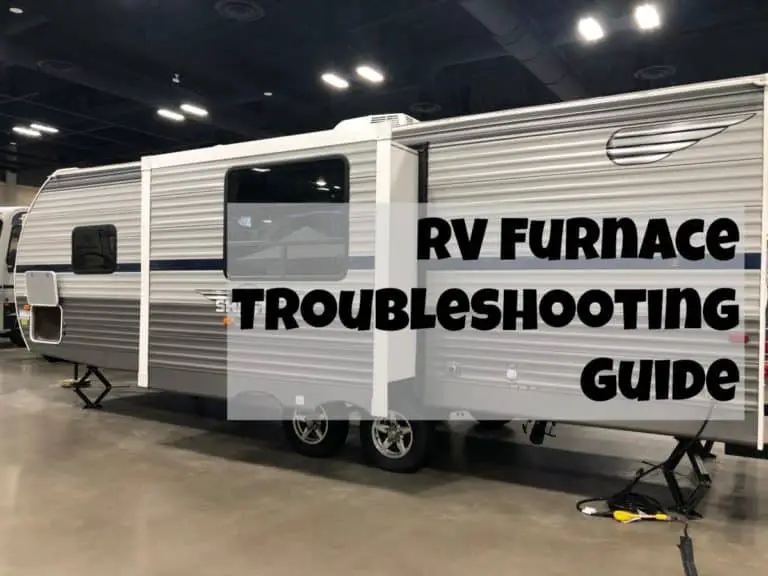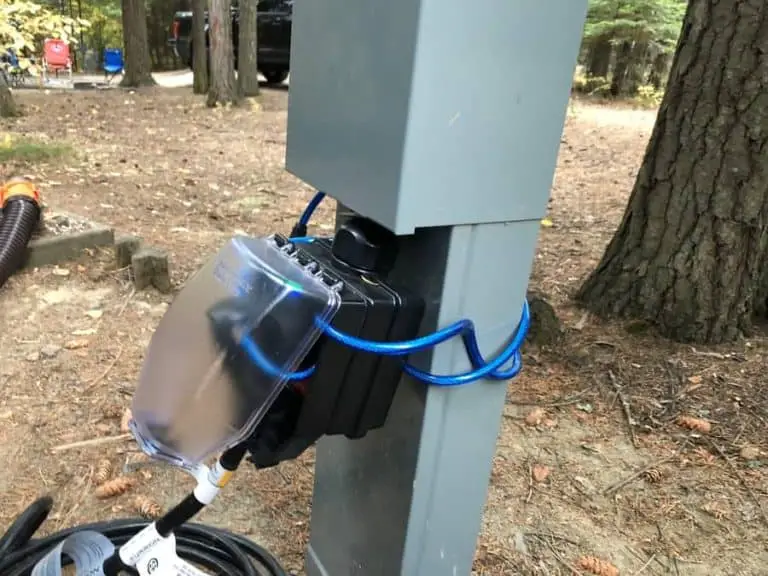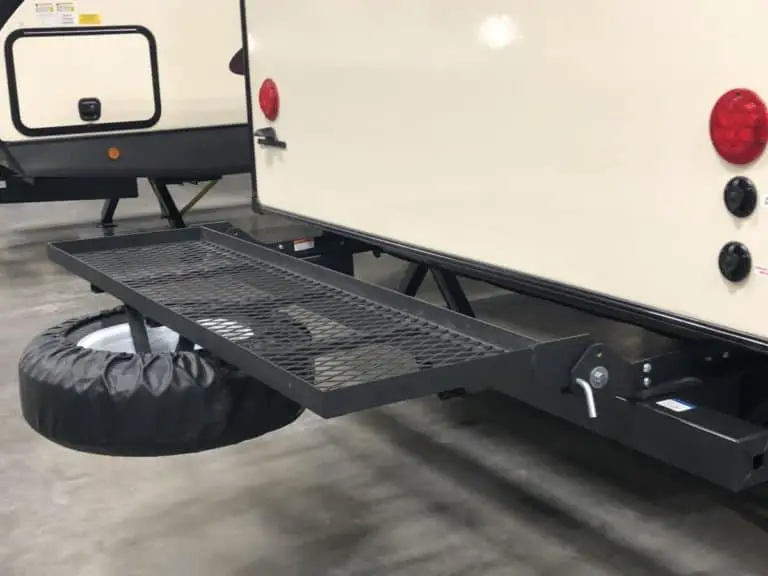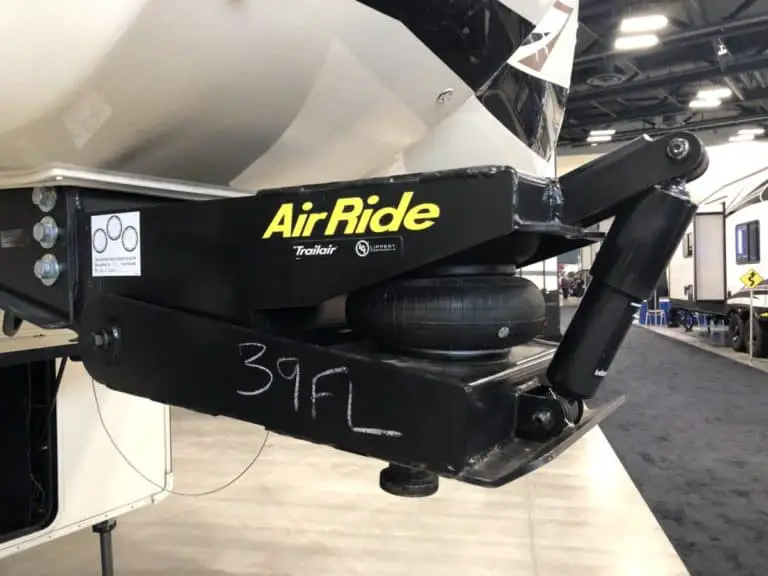Fixes for RV Air Conditioner Leaks in the Rain
Rain on a camping trip is less than ideal. It limits what activities you can do and soaks everything. Though, if you are camping with a recreation vehicle at least you can escape from the rain inside of the vehicle. However, when your RV has a few leaks, this plan fails and rainfall becomes an even larger problem.
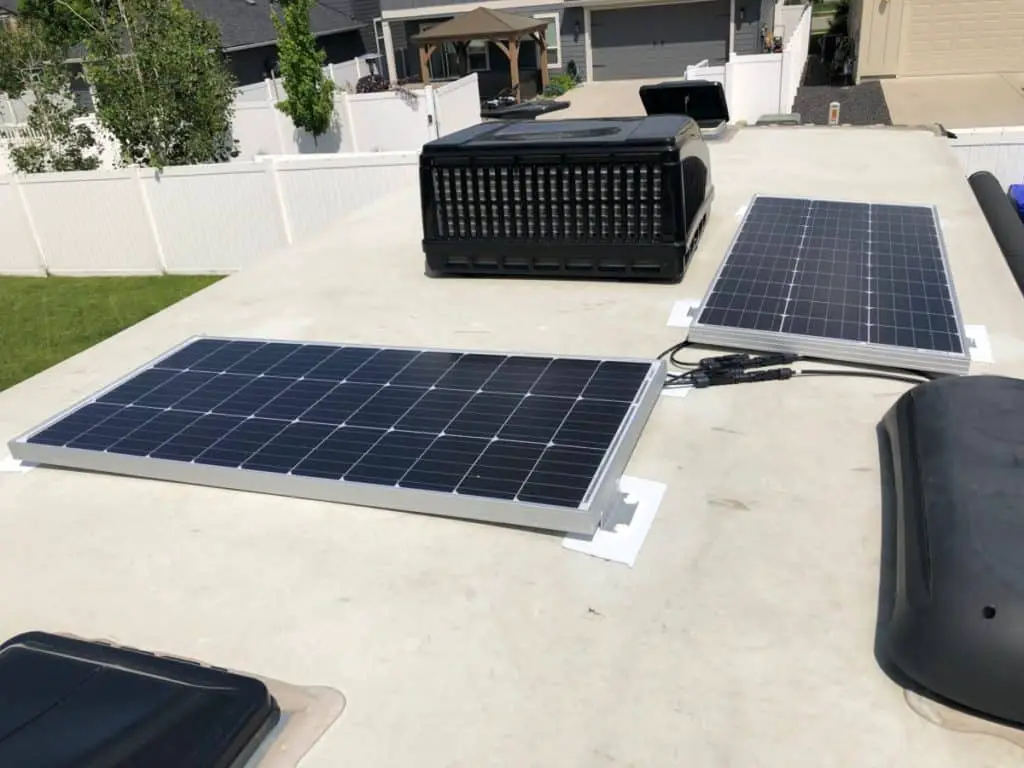
If your RV air conditioner unit is leaking, there are several culprits that might be causing the problem. Below the most common causes of a leaking air conditioner are discussed. Subsequently, the solutions to fix these causes are also explored. Therefore, if you found yourself getting dripped on by your rv air conditioner on your last road trip, you will want to continue reading below.
Why does my RV air conditioner leak in the rain?
RV air conditioners can leak in the rain due to faulty gaskets, cracked shrouds, broken bolts, leaky condenser hoses, and many other reasons. Troubleshooting leaks can be simple by removing your shroud and looking for water within your unit.
Common Reasons Your RV’s Air Conditioner is Leaking
At first, a leaking air-conditioner unit on your RV can seem like a big deal. After all, no RV owner wants to see water dripping from the roof from inside their vehicle. However, luckily, normally the solutions to fix a leaking air-conditioner are affordable and easy to apply. While the particular solution to solve your leak will vary, all of the solutions start with identifying the problem causing your air conditioner unit to leak in the first place.
Damaged Mounting/ Gasket
The most common reason your air conditioning unit is leaking is because of a damaged mounting bolt or rubber gaskets. These pieces of equipment are used to attach the air conditioning unit to the roof of your recreational vehicle. Over time, these mounting bolts and gaskets can shift or become damaged due to a variety of reasons including weather damage, being banged around while driving down the road, and general aging.
When these gaskets and bolts shift, water can start to pool up underneath them and eventually will begin to leak into the vehicle. When it rains these leaks will begin to drip water quicker and more profusely.
How to Repair Loose Air Conditioner Mounting Bolts and Gaskets
If you have a leaking air-conditioner unit on your recreational vehicle and you are able to discern that the unit’s mounting bolts or gaskets are the culprits, you will most likely want to take your vehicle into a repair shop. Obviously, you can opt to repair the gaskets and mounting bolts for yourself, but taking the vehicle into a repair shop will be quicker and maybe even less expensive if you are inexperienced at such repairs.
If you are looking to make the repairs yourself, you will want to first look at your mounting bolts, chances are they may have worked their way loose and you will just need to tighten them. Grab a socket wrench and secure them down with some Loctite and they will be good.
There may be a broken bolt on the ac unit. If this is the case, you will need to purchase replacement bolts and you may as well replace your gasket while you are at it. Your local hardware store and RV shop should have all the equipment you need: bolts, RV roof sealant, and ac gasket. Though occasionally a recreational vehicle will use an uncommon rubber gasket and it will need to be ordered from an RV store.
Don’t use rubber strips and make your own gasket as that can cause your unit to leak. Always purchase a one piece rubber gasket like this one to make sure your ac unit is free from leaks. Once you have these pieces of equipment, you will need to remove the air conditioning unit completely by loosening all of the mounting bolts.
Once the air conditioner unit is loose you will be able to replace the faulty rubber gaskets and mounting bolts with the new mounting equipment. Once you make these repairs, you will also want to apply caulking around the mounting bolts and hub of your unit to ensure new leaks do not form around your unit.
If you decide to take your vehicle into a repair shop to be serviced you can purchase the gaskets and bolts ahead of time to save money and time. This way, the only thing you will be charged for at the shop is general labor.
General Roof Damage
After damaged mounting equipment, the next most likely culprit of a leaky air conditioning unit on a recreational vehicle is general roof damage. Cracks or damaged caulking on the roof of your RV could lead to a leaking air conditioner unit. When the roof of an rv is damaged, water is likely to pool up in this area due to the fact that it is the lowest point on the vehicle’s roof. Normally, roof damage around the ac unit is more likely to cause leaks to form. However, general damage at any place on your recreational vehicle’s roof could cause a leaking air conditioner.
Most roofs on RV’s have some radius to shed water off of the roof. If you have a sagging roof, this can cause water to puddle and cause a roof leak through the AC unit. Rain water will take the path of least resistance, and the AC unit is the perfect place to leak.
How to Repair Miscellaneous Roof Damage on Your Recreational Vehicle
Most damage to a recreational vehicle’s roof is the result of exposure to natural elements. Over the life of a recreational vehicle, some roof damage is common. However, if you are noticing leaks then you will want to take your recreational vehicle into a repair shop to have it serviced. Unlike replacing the mounting bolts and gaskets, conducting your own roof repairs outside of resealing leaks with dicor sealant and eternabond tape on your recreational vehicle is highly discouraged. The necessary procedures to repair an RV roof are occasionally challenging and require specialized treatment.
When you take your recreational vehicle into the repair shop the mechanic will likely check to see if your vehicle’s roof is level and point out any damage that may be causing leaks to occur. If your mechanic does notice a low spot in your vehicle’s roof, they will likely reshape it and repair the area to prevent leaks from continuing.
Broken AC Shroud
A broken air conditioner shroud can cause a water leak into your rv interior. Even if the crack is on the side of the unit, rain can blow from all directions. Rain can penetrate into your ac unit, and go down the vent hole that is within your rv’s interior.
To identify if your leak is caused by a broken ac shroud, take a trip on your roof and inspect it. Another way to determine is that your leak will typically be coming down your vent hole into your RV. Take your interior ceiling shroud off and inspect to see where the leaky water is coming from.
How to repair a broken ac shroud on your RV
Eternabond tape can be used to repair a cracked air conditioner shroud. If the crack is too big or has a chunk missing, you may need to purchase and install a new ac shroud to keep the leak from happening. Either way, this is an easy fix that can get you back to the campground in no time.
Leaky Evaporator Coil
A leaky evaporator coil on your travel trailer or RV can cause an interior leak. To determine if this is the cause, determine if your ac leaks when it is off. If it does it is not a leaky coil, however, if you are using your ac in the rain and have a leak, this can be your cause.
A leaky evaporator coil may need to be repaired by a professional. Consult your rv repair shop to repair the coil. Sometimes they can be fixed, and sometimes you may just need to have a replacement installed.
Misplaced or Clogged Condensate Drain Line
Typically, your condensate drain will leak out from your ac unit and down the roof of your trailer. This line may become bound or develop a crack. This can cause water to leak into your ac unit and down into your trailer.
To determine if this is the culprit, go up on your roof while it is leaking and take a peek at the condensation hose to make sure it is in good shape. It may be a coincidence that it is leaking during the rain vs rainwater getting in.
To fix, simply reroute, replace, or fix your hose and you should be good to go.
Condensation Pan Causing Water Leaks
Your RV ac unit will have a condensation pan to hold the condensation prior to it leaking out of the hose. These pans can develop cracks or break causing water to leak inside of your RV.
If this is the case, it will leak both in the rain as well as in the sun. This will require you to visually inspect your condensation pan to determine if it is in fact leaking or good shape.
If it is broken, you will need to replace the pan as typically repairs don’t go so well.
Windy Rainy Day
Sometimes if the weather is getting winds from weird directions while raining, you could have a leak to your air conditioner unit without any actual issues.
The best way to determine your leak would be to use a garden hose to simulate a rainstorm coming from above. Then spray from different directions and you can determine water getting into your vent system. Next time you are out camping, you could simply place a cover on your RV AC and it will not let the wind blow rain into that section of your air conditioner.
Leaky RV Vent
A leaky vent could also be the cause of a leaking ac unit. As water can travel distances before it finds the path of least resistance and leaks into your trailer, a leaky ceiling vent can cause water to get into your ceiling area. The water can then leak down into your ac vent which is open causing you to think the cause is your air conditioner unit whereas it is really your vent.
To fix this, you may need to replace your vent cover, or get a maxxair cover as well.
How to Prevent New Leaks From Occurring in the Future
Once your rv’s leaks are repaired, you will most likely want to know what you can do to stop new leaks from forming in the future. Winterizing your recreational vehicle and consistently checking your air conditioner’s filter, drain vent, and air filter are standard preventive maintenance procedures you can follow to decrease the risk of air conditioner leaks. In addition, every time you store your RV for an extended time or pull it out after storing it, you should perform a routine inspection.
This inspection should include a variety of procedures including a check of your vehicle’s air conditioning unit. During these inspections, you are likely to notice any damage that has occurred to your vehicle’s air conditioning unit. If you notice cracks in the caulking around your unit or water pooling on your vehicle’s roof, you should perform the necessary repairs or take the vehicle into a repair shop immediately. If you fail to address these issues right away, more damage and more extensive leaks could form.
An a/c cover could help protect it from the elements as well as from UV rays which will make your shroud brittle and crack. They are even helpful with wind and rain storms keeping the rain out of your ac unit as well as keeping the heat in.
Additional Services to Consider
If you have yet to notice any leaks to your vehicle’s air conditioning unit, you can continue to be one step ahead of these leaks by having a professional inspect your vehicle every so often. It is not necessary to have your air conditioning unit checked every month. However, if you are already taking your vehicle into the repair shop to address another issue, there is no reason not to have a general inspection of your vehicle’s roof and air conditioning unit completed. These inspections are generally pretty reasonable and will cost less than some repairs you might need to address in the future.
Conclusions
Leaks on a recreational vehicle are frustrating, annoying, and can ruin a road trip. As previously discussed, if you notice your vehicle’s air conditioning unit is leaking during a rainstorm the most common culprits of these leaks are roof damage and damaged mounting equipment. You may be able to make the necessary repairs to fix these leaks yourself.
However, the best course of action is to always bring your RV into a licensed repair shop. Once your leaks are fixed, you can perform routine inspections to your vehicle’s air conditioning unit and roof to stay ahead of future damage. Properly winterizing and de-winterizing your vehicle are also great procedures to follow to prevent leaks and other damage to your RV from occurring.
Be the first to be notified about FREE tips, hints, coupon codes, and email-exclusive information. All for FREE!

